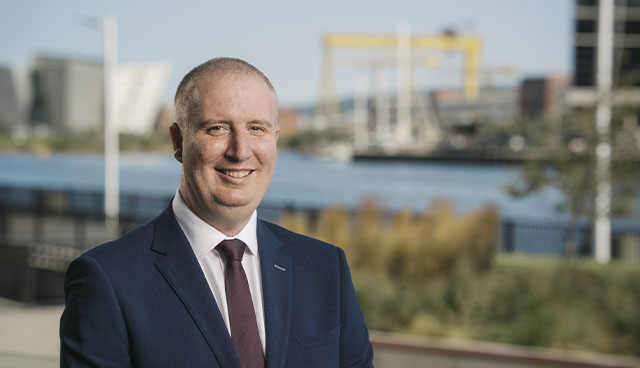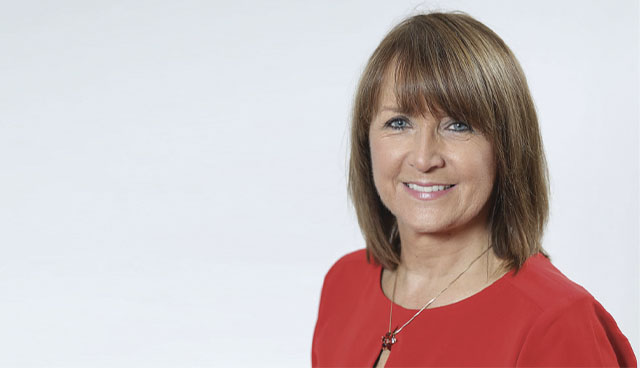Openreach continues to pave the way to a digital revolution in Northern Ireland

With demand for online services continuing to increase, the role that Openreach Northern Ireland plays in keeping people connected has never been more important.
Openreach, Northern Ireland’s largest digital infrastructure provider continues to invest in the future of Northern Ireland having recently announced that 80 per cent of homes and businesses can now get its next generation Ultrafast Full Fibre broadband, that’s 4 out of 5 properties.
Full Fibre broadband is up to 10 times faster than the average home broadband connection. For example, you can download a two-hour HD film in less time than it takes to make a cup of tea. And video gamers could download a 5-gigabyte virtual reality (VR) game in 1.7 minutes, instead of waiting half an hour with a traditional copper based broadband line. The service is delivered over fibre optic cables running right to the property, which also means Ultrafast Full Fibre broadband is five times more reliable than traditional copper based broadband connections. Greater capacity means more devices can be connected, so more people can get online at once without experiencing any slowdown, buffering or dropouts. And demand continues to grow, with more and more Northern Ireland homes and businesses ordering a Full Fibre service.
Chief Executive of NI Chamber Ann McGregor says: “I was delighted to hear news of this significant milestone in Northern Ireland. Openreach are leading the way in terms of their transformative broadband technology, and to hit 80 per cent coverage of the region is a fantastic achievement.”
McGregor adds: “The digital future of Northern Ireland is extremely positive. The Openreach investment, alongside other commercial programmes and publicly funded interventions puts Northern Ireland in an enviable position well ahead of our near neighbours, as the most connected region in the UK and in Ireland. In fact, access to 1,000 Mbps Full Fibre broadband in Northern Ireland is on a similar footing with global leading countries such as the Nordics and the Asia Pacific region. This is a fantastic opportunity for local businesses and government to take advantage of, while we are ahead of other regions.”
The pandemic highlighted our reliance on fast and robust broadband. In fact, demand for broadband over the Openreach network doubled during 2020 and increased a further 20 per cent during 2021.
Director of Openreach NI, Garret Kavanagh comments: “What we are doing at Openreach has an important impact on the lives of everyone in Northern Ireland. Reliable broadband is often considered as the fourth utility, alongside gas, water, and electricity, something that most of us would struggle to live without. We have gone from the internet being a source of information to it being our primary channel for communication, work and education.
“The past couple of years have really accelerated already established trends where we have seen the use of online solutions becoming a greater part of our lives as we have been unable and perhaps reluctant to leave home. For example, many transactional services have moved online, and people feel much more comfortable and confident about things like submitting a planning application, booking appointments, or having a meeting using Teams or Zoom rather than face to face.”

“Openreach are leading the way in terms of their transformative broadband technology, and to hit 80 per cent coverage of the region is a fantastic achievement. The digital future of Northern Ireland is extremely positive. The Openreach investment, alongside other commercial programmes and publicly funded interventions puts Northern Ireland in an enviable position well ahead of our near neighbours, as the most connected region in the UK and in Ireland.”
The ambition which has been set out in the Department for Economy’s ‘Vision for the Economy’ embraces innovation to deliver 10 times better economic growth, and with the current availability of gigabit capable broadband to residents and businesses, the opportunities for digitisation are enormous.
International benchmarks show that Full Fibre broadband coverage not only has a positive impact on households by revolutionising the way we live, but it can also accelerate economic growth. In Sweden, where there is similar coverage, studies have shown that those connected to Full Fibre broadband are 11 per cent more active online, have more devices connected to the internet and have higher customer satisfaction levels. The same report shows 4.8 per cent more start-ups in French municipalities with high levels of Full Fibre access.
The next Programme for Government offers an opportunity to maximise the benefits of this world leading platform, at a time when there are significant pressures across public sector services including health and social care. Accelerating the digitisation of public services to improve service levels to citizens, whilst reducing back-office costs has been underway for some time. The next challenge is to create smart platforms to seamlessly introduce citizens to the services they need but may not know about. This coupled with the adequate provision of digital skills training to ensure no one is left behind could lead to an unprecedented shift in how citizens engage with public services.
Kavanagh continues: “This Full Fibre technology will open up endless opportunities, enabling and encouraging the set-up of new businesses, social initiatives and online products, services that we can’t even imagine yet. It will support economic and social regional rebalancing as high-speed connectivity means people do not have to live in large urban centres for high paid jobs or to access the best goods and services.
“As more people continue to work flexibly, it will also support a more sustainable future, leading to less journeys and reduced CO2 emissions. A recent report by the Centre for Economics and Business Research, predicted a saving of 700,000 tonnes of carbon from reduced commuting, as a result of upgrading the UK to Full Fibre.
Keen to live out sustainable values in its own business, Openreach NI has also pledged to endeavour to convert its diesel fleet to electric and other renewable fuels by 2030, aiming to achieve their ambition of net zero carbon emissions. Installing and maintaining the digital network is a huge operation, and with one of the largest van fleets on the road in Northern Ireland necessary for essential work every day, reducing their carbon footprint is a big focus for Openreach NI.
“We understand the need to act on climate change and we are committed to reducing our operational impact. We’ve created a dedicated Openreach project team, focussing on cutting fleet emissions and helping to identify alternative, cleaner technologies, actively looking to phase-out diesel vehicles by replacing them with electric vehicles. It’s important that we pay back to the communities we live in,” Kavanagh says.
The UK Government has set a target for the digital infrastructure industry to achieve 85 per cent Full Fibre coverage by 2025. In Northern Ireland Openreach has already achieved 80 per cent coverage and build work is continuing to extend the network further. The challenge now is for individuals, communities, business owners and public services to take advantage of all the possibilities this digital capability offers.
For more information contact nihelp@openreach.co.uk





